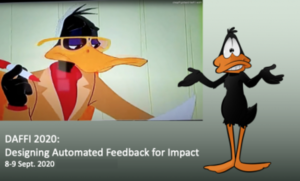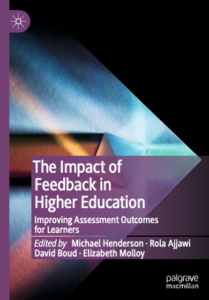Time: 09:00 AM
Location: Zoom
This is a two-day event
We all know that feedback is critical for learning — and we all appreciate how demanding this can be for educators to provide, to many students, in a consistently motivating, and detailed way. This is a challenge studied by educational researchers of feedback design and feedback literacy.
Designing Automated Feedback for Impact brought some of the leading researchers in this field into a 2-day dialogue with researchers developing automated-feedback tools using Learning Analytics/AI. The original concept was to bring the editors and authors from The Impact of Feedback in Higher Education: Improving Assessment Outcomes for Learners (Eds. Henderson, Ajjawi, Boud & Molloy) to the UTS Connected Intelligence Centre, to spend 2 days in a workshop. The pandemic shifted this online, but the goals remain the same and moving online enabled us to more easily bring in additional participants.
“This book asks how we might conceptualise, design for and evaluate the impact of feedback in higher education. Ultimately, the purpose of feedback is to improve what students can do: therefore, effective feedback must have impact. Students need to be actively engaged in seeking, sense-making and acting upon any information provided to them in order to develop and improve. Feedback can thus be understood as not just the giving of information, but as a complex process integral to teaching and learning in which both teachers and students have an important role to play. The editors challenge us to ask two fundamental questions: when does feedback make a difference, and how can we recognise that impact?”
We call for a deeper dialogue between researchers in the design of assessment and feedback in higher education, and researchers developing automated-feedback tools using Learning Analytics/AI.
Perhaps we can learn from each other:
- designers of automated feedback (for students or educators) are challenged on how they could build more robustly on principles of good feedback design;
- researchers and educators working on feedback design are challenged as to whether automated feedback opens up new possibilities not taken into account in prior research;
- potentially, new concepts may emerge that provide important language to clarify a changing design space for “feedback-rich environments” (as the book terms them);
- new opportunities for learning analytics to tackle obstacles to the uptake of better feedback design practices;
- identify topics for future events, and potential next steps.

